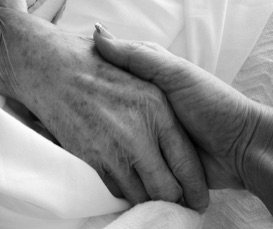
End

Resources for
Starting the Conversation
Websites
A non-profit, grassroots organization "dedicated to helping people talk about their wishes for end-of-life care.
"It’s time to transform our culture so we shift from not talking about dying to talking about it. It’s time to share the way we want to live at the end of our lives. And it’s time to communicate about the kind of care we want and don’t want for ourselves.
"We believe that the place for this to begin is at the kitchen table—not in the intensive care unit—with the people we love, before it’s too late.
This website and a film of the same title are aimed at helping "individuals and groups speak openly about all aspects of the dying process." The film, "infomative yet intimate," grows out of the work of Trudy James, MRE, an interfaith chaplain who, since 2008, has led "a series of community-based, end-of-life planning sessions called 'A Gift for Yourself and Your Loved Ones.'" Even the brief trailers for the film on the website are informative and helpful.
"How we want to die – represents the most important and costly conversation America isn’t having. We have gathered dozens of medical and wellness leaders to cast an unflinching eye at end of life, and we have created an uplifting interactive adventure that transforms this seemingly difficult conversation into one of deep engagement, insight and empowerment."
Books
Being Mortal
by Atul Gawande
A practicing surgeon and professor at Harvard Medical School, Gawande explores through research and personal experience the limits and failures of modern medicine to provide approprate care for the dying and alternative approaches that focus on the patient's well-being rather than on medical treatment.
The Conversation
A Revolutionary Plan for End-of-Life Care
by Angelo E. Volandes
Where Being Mortal presents the philosophical and ethical argument for rethinking our approach to dying and end-of-life care, The Conversation focuses on practical changes that need to occur in order to insure that end-of-life care is shaped around patients' informed decisions about care and quality of life. Both Volandes' and Gawande's books are inspiring and helpful; this one just focuses a bit more on the specifics of "the conversation."


"Five Wishes" is the name of a document that "has become America’s most popular living will because it is written in everyday language and helps start and structure important conversations about care in times of serious illness." It meets the legal requirements for a living will in 42 states (including New Jersey) and is useful in all 50. The name "Five Wishes" refers to both the document and the program of resources of which it is the core, sponsored by Aging with Dignity, "a national non-profit organization with a mission to affirm and safeguard the human dignity of individuals as they age and to promote better care for those near the end of life." At their website you can download a copy of the "Five Wishes" document or complete an on-line "Five Wishes" tool.
Click here to preview a sample of the "Five Wishes" form.
This nonprofit organization, based in Princeton, New Jersey, is dedicated to empowering patients with advanced incurable conditions to identify, in consultation with their health care providers, their own goals of care. The GOC website provides a wealth of information on the NJ POLST form and includes a series of brief videos aimed at helping patients and their families initiate a conversation about goals of care with their health care providers.
On Death & Dying
by Elisabeth Kübler-Ross
In this book, credited with giving rise to the hospice movement, Kübler-Ross provided a model for listening to the voices of the dying and respecting their wishes. She famously explored the five stages of dying: denial, anger, bargaining, depression, and acceptance. Originally published in 1969, On Death & Dying still challenges and inspires us, in her own words, "not to shy away from the 'hopelessly' sick but to get closer to them."